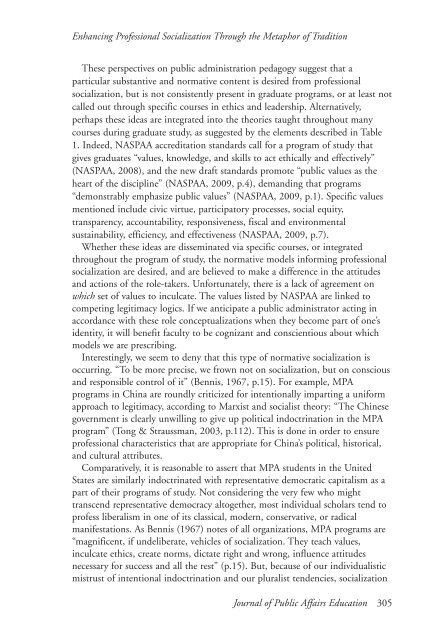JOURNAL OF PUBLIC AFFAIRS EDUCATION - naspaa
JOURNAL OF PUBLIC AFFAIRS EDUCATION - naspaa
JOURNAL OF PUBLIC AFFAIRS EDUCATION - naspaa
Create successful ePaper yourself
Turn your PDF publications into a flip-book with our unique Google optimized e-Paper software.
Enhancing Professional Socialization Through the Metaphor of Tradition<br />
These perspectives on public administration pedagogy suggest that a<br />
particular substantive and normative content is desired from professional<br />
socialization, but is not consistently present in graduate programs, or at least not<br />
called out through specific courses in ethics and leadership. Alternatively,<br />
perhaps these ideas are integrated into the theories taught throughout many<br />
courses during graduate study, as suggested by the elements described in Table<br />
1. Indeed, NASPAA accreditation standards call for a program of study that<br />
gives graduates “values, knowledge, and skills to act ethically and effectively”<br />
(NASPAA, 2008), and the new draft standards promote “public values as the<br />
heart of the discipline” (NASPAA, 2009, p.4), demanding that programs<br />
“demonstrably emphasize public values” (NASPAA, 2009, p.1). Specific values<br />
mentioned include civic virtue, participatory processes, social equity,<br />
transparency, accountability, responsiveness, fiscal and environmental<br />
sustainability, efficiency, and effectiveness (NASPAA, 2009, p.7).<br />
Whether these ideas are disseminated via specific courses, or integrated<br />
throughout the program of study, the normative models informing professional<br />
socialization are desired, and are believed to make a difference in the attitudes<br />
and actions of the role-takers. Unfortunately, there is a lack of agreement on<br />
which set of values to inculcate. The values listed by NASPAA are linked to<br />
competing legitimacy logics. If we anticipate a public administrator acting in<br />
accordance with these role conceptualizations when they become part of one’s<br />
identity, it will benefit faculty to be cognizant and conscientious about which<br />
models we are prescribing.<br />
Interestingly, we seem to deny that this type of normative socialization is<br />
occurring. “To be more precise, we frown not on socialization, but on conscious<br />
and responsible control of it” (Bennis, 1967, p.15). For example, MPA<br />
programs in China are roundly criticized for intentionally imparting a uniform<br />
approach to legitimacy, according to Marxist and socialist theory: “The Chinese<br />
government is clearly unwilling to give up political indoctrination in the MPA<br />
program” (Tong & Straussman, 2003, p.112). This is done in order to ensure<br />
professional characteristics that are appropriate for China’s political, historical,<br />
and cultural attributes.<br />
Comparatively, it is reasonable to assert that MPA students in the United<br />
States are similarly indoctrinated with representative democratic capitalism as a<br />
part of their programs of study. Not considering the very few who might<br />
transcend representative democracy altogether, most individual scholars tend to<br />
profess liberalism in one of its classical, modern, conservative, or radical<br />
manifestations. As Bennis (1967) notes of all organizations, MPA programs are<br />
“magnificent, if undeliberate, vehicles of socialization. They teach values,<br />
inculcate ethics, create norms, dictate right and wrong, influence attitudes<br />
necessary for success and all the rest” (p.15). But, because of our individualistic<br />
mistrust of intentional indoctrination and our pluralist tendencies, socialization<br />
Journal of Public Affairs Education 305
















